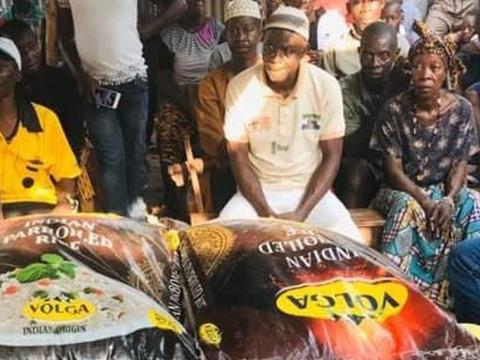Leveraging lessons from their experiences during the 2014-2016 Ebola outbreak, the capital city of Sierra Leone, Freetown, has been providing its most vulnerable residents with food packages so they can stay safe and healthy in quarantine.
“Food insecurity is a risk to COVID-19 containment because people can’t stay home if they have nothing to eat. On top of that, the pandemic has made access to high-quality nutrition even more difficult than usual,” says Mayor Yvonne Aki-Sawyerr. “That’s why the Freetown City Council has been working with partners to bring healthy, nutritious food to its citizens during the pandemic.”
Around 30% of Freetown’s 1.2 million residents have an available family income of less than 1 USD per day and 47% do not have direct access to running water. In Sierra Leone, the sheer scale of the food insecurity challenge was highlighted in a national survey carried out in April, where only 12% of respondents answered they could gather food for one week or more, while 60% said they could not sustain ‘lockdown’ or movement restrictions for more than three days at a time.
In April during a national three-day order to stay at home, the city government provided emergency food packages to 6000 households in three informal settlements. These donations supplemented national government provisions, whilst also helping and encouraging residents to follow quarantine measures.
Through an urban farming initiative, the city is also supporting sustainable access to nutritious food while building resilience to future crises. During the ongoing pandemic, communities in informal settlements will be supported to grow their own vegetables, beginning with training individuals and youth groups on planting, watering and composting. Work is underway to make water available outside of rainy season.
As a member of the Partnership for Healthy Cities – a global initiative by Bloomberg Philanthropies, the World Health Organization and Vital Strategies – Freetown has also shared early experiences and lessons learned during the pandemic response with other cities in the region and globally.
Sierra Leone is already one of 25 countries identified as at risk of significant food security deterioration as a result of the COVID-19 pandemic by the Food and Agriculture Organization of the United Nations (FAO) and the World Food Programme (WFP).
The number of people facing acute food insecurity in these countries is predicted to almost double to 270 million before the end of 2020 without an acceleration of protection programmes.
Food security is worsening during COVID-19 as a result of household purchasing power declining from loss of income and remittance, and disruptions to food production and supply chains. There is also concern that overwhelmed governments, increased political instability and aggravated conflict dynamics caused by the pandemic will exacerbate the situation further.
“Cities like Freetown, facing the dual crisis of acute food insecurity and the COVID-19 pandemic, alongside the prospect of further deterioration of food insecurity, must preserve and strengthen existing nutrition programmes,” says Dr. Steven V. Shongwe, Acting WHO Representative in Sierra Leone.
“Freetown is a good example of local government considering new social protection measures to protect vulnerable populations who are at increased risk of economic hardship due to the pandemic, which may negatively impact access to healthy food at a time when it is most needed.”
Source: WHO
Copyright © 2020 Politico Online








